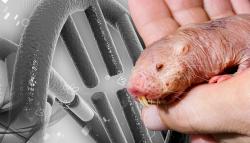The continuous increase in life expectancy and age-related diseases represents an ethical and economic challenge to human society. The German government tagged the demographic change as a central topic in their politics and launched a research agenda “Age has a future” at the end of November 2011. Therefore it is of outstanding interest – for individuals as well as for the community – to find new paths in age research, how to extend good health in a given lifespan (“healthspan”).
The innovative research approach within the framework of the “Joint Initiative Research and Innovation” is a cooperation between two Leibniz Institutes, the Leibniz Institute for Age Research - Fritz Lipmann Institute (FLI) in Jena and the Leibniz Institute for Zoo and Wildlife Research (IZW) in Berlin to analyse molecular networks, which are responsible for an unusually long and healthy life in naked mole-rats (Heterocephalus glaber). The project is financed with 1.5 million euro within three years by the Federal Ministry of Education and Research (BMBF) and the Federal States.
“The project demonstrates the active cooperation of the new strategic age research association within the Leibniz Association,” says Dr Wilfried Briest, research coordinator at the FLI. “We want to bundle knowledge and power of two Leibniz Institutes, to analyse this impressive African rodent, which not only has an extremely long lifespan but also an extremely long healthspan”, comments Dr Matthias Platzer from the FLI, the coordinator at the PAKT project.
With this research project the scientists tread new paths in age research. Until now the research concentrated - for reasons of practicability - on short-lived animals, such as the roundworm Caenorhabditis elegans, with an average lifespan of three weeks, or the fruit fly (Drosophila melanogaster) which has an average lifespan of three months. Even the mouse (Mus musculus), human's closest phylogenetic relative among the model organisms in age research, belongs to the short-lived animals with a lifespan of about four years.
On the other hand, humans, with a lifespan of over 100 years, belong to the group of long-living species, therefore age researchers debate whether long-living organisms must be included in age research in order to understand the biology of human ageing.
Mouse-sized naked mole-rats, who live in the East African savanna, are very exciting for age research: they can live as long as 30 years, and they do not suffer from age-related diseases – in contrast to humans and to other rodents. So far, there was no case of cancer recorded for this species. The rodents are perfectly adapted to a life below ground (zoological family: blesmols, Bathyergidae), they build extensive tunnel systems, which they almost never leave. Under these conditions, they have developed a unique division of labour: like state-building insects (honeybees, ants, termites), only one female mole-rat reproduces; brood care, food-procurement as well as the enlargement and defence of their burrow system are practiced collaboratively.
Astonishingly the breeding “queen” lives much longer than her conspecifics. “It is in total contradiction to the common theory of ageing in which organisms invest their energy either in reproduction or in conservation of its body functions”, emphasizes Dr Thomas Hildebrandt (IZW). The scientists have several samples from a mole-rat-breeding programme based in Berlin’s IZW as well as samples from free-living mole-rats from international cooperation partners, to explain how mole-rat queens combine extreme physical exertion of consecutive pregnancies with remarkable health and longevity.
“With the help of modern sequencing technologies, we want to measure how intense the different genes are transcribed. This will lead us to the identification of molecular networks underlying the exceptionally long life- and healthspan of naked mole-rats”, explains Dr Karol Szafranski (FLI). In the course of the project, the scientists are expecting the development of synergistic effects to the “Jena Centre for System Biology of Ageing - JenAge”. Founded in 2009 and coordinated by the FLI, this collaborative effort deals with the role of mild stress and healthy ageing. As a result of the PAKT-project, scientists are hoping to find new results, which can be transferred to human and give an important contribution to a long-lasting life in health.









